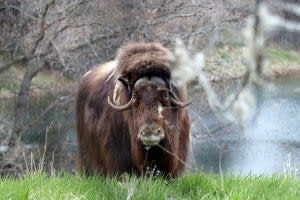Minnesota Zoo puts down animals because state has become too warm

Pearl the musk ox explores her habitat at the Zoo in early spring 2021.
(Minnesota Zoo)Two animals at Minnesota Zoo were recently put down by keepers because the midwestern state is too warm.
The musk oxen were first introduced to the zoo in Apple Valley, Minnesota, in 1978, and are native to the Arctic tundra, where average temperatures are far cooler.
In a statement on Thursday, Minnesota Zoo confirmed that two remaining musk oxen were put down, because of the changes in humidity and the seasons, in addition to higher temperatures.
The animals were two female suffering age related issues that were “compounded by the spring and summer heat,” according to the zoo.
“Issues” with the herd were first reported a decade ago, and related to the heat.
“The difficult decision was made to humanely euthanize the elderly pair” in April, after a decade of winding-down the Minnesota Zoo’s herd of musk oxen.
Cindy, the zookeeper for the animals, said: “You could tell they were thriving when the temperatures were colder and then the minute the heat and humidity hit, that’s when I really started watching and could notice changes.”
Average temperatures in Minnesota are 2F (1.1C) higher today than at the beginning of the 20th-century, according to the National Centres for Environmental Information (NCEI).
And since 2000, Minnesota has experienced seven of it’s 10 warmest years, with warmer air from the arid west and southwest pushing further northwards, towards the US border with Canada.
Arctic tundra temperatures, where the musk oxen are native, can range from -30 to 20F (-34 to -6C), according to National Geographic.
Dr. Taylor Yaw, manager of the Minnesota Zoo’s Animal Health department, added: “We have a responsibility to these animals. When it comes to a point that we can’t manage clinical health issues, this is the most humane choice we can make.”
The herd of musk oxen in Minnesota were among the most successful of any North American zoo, with 65 calves born from two females from Calgary, Canada, and two males from Winnipeg.
Read More
The Independent visits Heathrow ahead of international travel restarting
How to plant a tree for the Queen’s platinum jubilee
UK plastics shipped out, dumped and burned in Turkey, investigation finds
